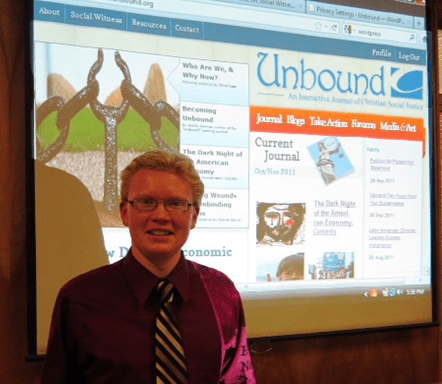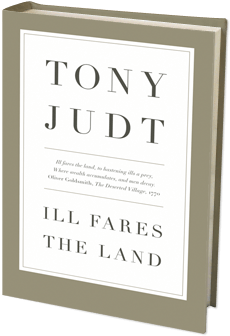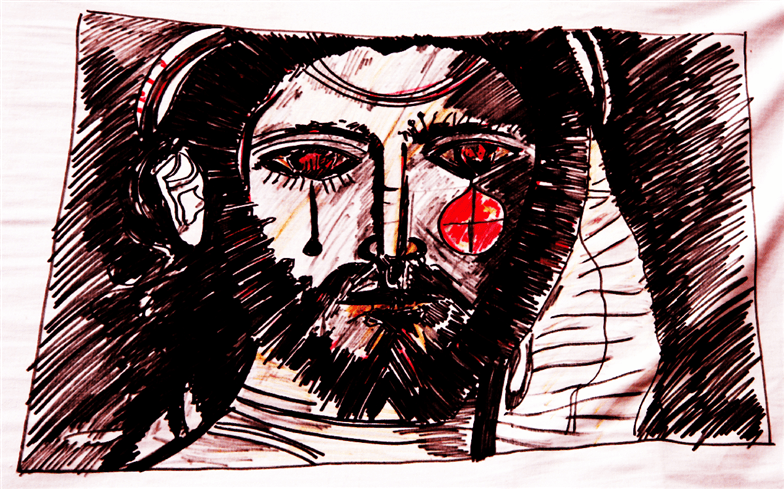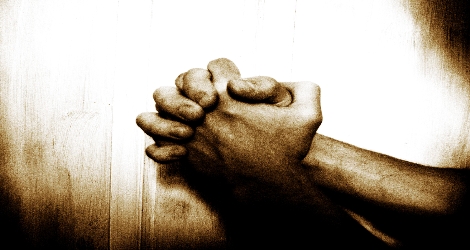[wpcol_1half id=”” class=”” style=””]
The Passage of Two World Wars
The shift in approach from the Social Gospel to the post-World War II Christian Realism was visible in a growing acceptance of a “mixed economy” and fewer calls for a “cooperative commonwealth.” The Cold War opposition to officially Communist societies, however, did not erase the acceptance of a major government role in the economy, progressive taxation to create public goods, and growing worker and social protections, eventually including some measure of environmental protection. An illustration of the shift in thinking can be visible in the major 1944 statement, The Church and Industrial Relations, which endorsed unions as “a primary agent of democracy,” while also encouraging social harmony and shared management practices. By 1947, General Assembly economic statements began using the language of “countervailing” in addition to “cooperating” powers. The use of power analysis increased as Reformed Christian concern for social reform was seen to require engagement by the church as a corporate entity supporting systemic social change, and not simply the general exhortation of individuals.
Corporate Mode
Some historians point to the 1950’s and 1960’s as a transitional time when denominations adopted management and organizational structures from corporations. But the theological and ethical emphasis on collective social witness often led to conflict with corporations, as in the corporate social responsibility movement, consumer boycotts, and selective purchasing policies to support equal employment opportunity for racial minorities and later women. A significant body of thinking accompanies the Church’s Mission Responsibility Through Investment (MRTI) strategy (beginning 1971), emphasizing both the integrity of the church as an investor and employer itself, and its role in effecting social change through the advocacy of shareholder resolutions and, when necessary, divestment. The General Assembly Mission Council’s 1979 analysis of boycotts found them to be consistent with its earlier prohibition, anti-gambling, anti-tobacco, anti-child labor and other efforts, up to support for the Equal Rights Amendment.[4] The MRTI efforts, particularly on South Africa, human rights, military production, and the environment, used the church’s ownership position “inside” companies for moral leverage and made the best of the limited structures of shareholder democracy.[5] Added to MRTI starting in 1975 was a “creative investment” program to invest a limited portion of unrestricted investments in cooperatives and alternative enterprises not served by the usual marketplace.[6]
Let us consider the debates prompted by this corporate responsibility work before turning to the two denominational tracks’ treatments of broader economic questions. A major study, “The Task Force on Review of the Policies, Strategies and Programs of the United Presbyterian Church Related to Transnational Corporations” (1983), looked at criticisms of that church’s economic advocacy and re-affirmed MRTI and other approaches.[7] In illuminating the influence of The Confession of 1967 on mission theology during the late 1960s and 1970s, it cites the final report of the Board of National Mission in 1972 to identify three key approaches: self-determination (also “self-development of people”), advocacy (for minorities and those without power), and empowerment (or “enablement”), all antecedents of the liberation theme in theology.[8]
A New Economic Ethic
In 1972, within a policy statement, The Elimination of Poverty and Unemployment, came a call for “a task force to examine the impact of our economic system on the environment, continuing problems of poverty and international economic development, and alternative economic life-styles…” In 1974, this charge was refined “to develop an in-depth stewardship ethic to help us as individuals and as a church to reconcile the operation of the ecological, technological, and economic systems as they affect creation.”[9]
[/wpcol_1half] [wpcol_1half_end id=”” class=”” style=””]
The result was Economic Justice Within Environmental Limits: The Need for a New Economic Ethic (1976), a study designed as a call for churchwide dialogue (not debate) about the consequences of an economy driven by material consumption creating increasingly recognized environmental degradation. Issued in the year of the American Bicentennial observance, “a major underlying theme of this study is an exploration of the prospects for economic democracy in the United States.” This discussion “can and should avoid the jargon of ‘capitalism vs. socialism,’ according to the Council on Church & Society:
For many decades, the United States has exhibited a mixed economy, combining private enterprise with manifold examples of public regulation, public ownership, public financial subsidy, and public investment… created… largely at the behest of the private sector…Public participation and its attendant public accountability through government has not meant automatic public ownership…
Because of the persistence of poverty, the end of the illusion of infinite progress based on industrialization, and yet the continued striving for wealth without limits, the three areas of distribution, production and consumption all needed a new ethic.
Much of the “new economic ethic” was to be built on a broadened conception of stewardship that would explicitly include
a type of economic planning that decentralizes as much of the decision making as possible, and includes the necessary checks and balances on all planning functions, and more decentralization of economic power… (through) meaningful citizen participation… increased corporate accountability…(and) movement toward economic democracy, i.e. an economy by and for all the people.[10]
Slightly later, starting in 1978, the PCUS called for the development of “a contemporary statement on Christian faith and economics.”[11] This study followed Walter Brueggemann’s formulation in contrasting a social order characterized by a theology of God’s sovereignty, a politics of justice and an economy of respect with a social order marked by a religion of control, a politics of oppression and an economics of privilege. Its theology affirms a justice built into creation and contains a strong understanding of social as well as personal sin, partly to frame its own treatment of economic ideologies. After establishing six criteria for evaluating economic systems (equality, sustainability, sufficiency, concern for the poor, community, and liberty), it outlines characteristics of “democratic socialism” and “democratic capitalism” for evaluation, urging readers to make a choice above all “for the side of the poor.” This study was commended for study by the 1984 General Assembly and also linked to work then in progress on “A Just Political Economy.”
Work had begun in 1982 in the UPC on “issues of justice in the life of the nation and the world” and “the effects of changes… of funding social programs upon racial ethnic minorities and upon the poor” by what was originally envisioned as a Standing Committee on Economic Policy, a 20 member “blue ribbon” committee chaired by former Secretary of Labor and economist Ray Marshall. What marked this study were two innovations: a teleconference on December 3, 1983, linking 1300 Presbyterians at 36 sites to view and discuss a professionally designed 2 hour program produced by the church’s media staff, and the widespread distribution of a pamphlet in advance of the 1984 election entitled, “Questions to Candidates and Directions for Holding Candidate Forums.”[12]
[/wpcol_1half_end]






Unbound Social